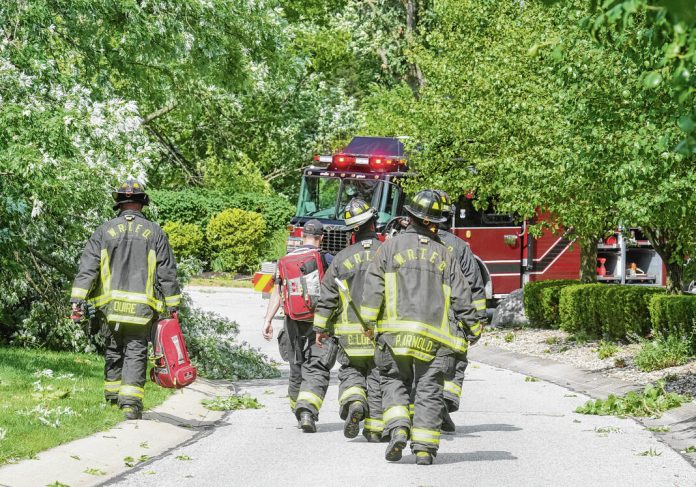As local residents begin to clean up from storms, officials say safety is paramount.
Knowing what to do in the wake of a severe storm or disaster can help prevent injuries and accidents. A study of injuries after a tornado in Marion, Illinois, showed that 50% of the tornado-related injuries were suffered during rescue attempts, cleanup and other post-tornado activities, according to the National Weather Service.
Any storm that damages power lines, gas lines, or electrical systems, puts you at risk due to fire, electrocution, or an explosion.
Officials have tips that can help residents prevent injuries:
- Be aware of hazards from exposed nails and broken glass.
- Do not touch downed power lines or objects in contact with downed lines. Report electrical hazards to the police and the utility company.
- If it is dark when inspecting your home, use a flashlight rather than a candle or torch to avoid the risk of fire or explosion in a damaged home.
- If you see frayed wiring or sparks, or if there is an odor of something burning, you should immediately shut off the electrical system at the main circuit breaker if you have not done so already.
- If you smell gas or suspect a leak, turn off the main gas valve, open all windows, and leave the house immediately. Notify the gas company, the police or fire departments, or State Fire Marshal’s office, and do not turn on the lights, light matches, smoke, or do anything that could cause a spark. Do not return to your house until you are told it is safe to do so.
Residents who need to fix their damaged home or business should stay aware as this is prime time for scammers to take advantage of people, officials say.
The key to avoiding fraud is being thoughtful versus reactive and desperate, according to the National Center for the Prevention of Home Improvement Fraud.
Local reports of people cheating storm victims haven’t come in yet. But following the Whiteland tornado earlier this year, officials offered some tips for finding a reputable contractor to repair or rebuild their home or business.
It is important to vet contractors and to watch for common gimmicks that are meant to manipulate people into hiring them, Sheriff Duane Burgess said in April.
“We have a lot of good people in and around Johnson County who do good work, but there are also people out there who are going to prey on emotions,” Burgess said. “We don’t want anyone to be taken advantage of.”
Burgess, along with Indiana Attorney General Todd Rokita, have warned of people who go door to door offering to make repairs. Sometimes, faux contractors appear on people’s doorsteps, promise to make needed repairs, and then disappear with a down payment in their pockets but never to return to do the work, they said.
Burgess said these types of scammers target neighborhoods that were damaged by storms and use high-pressure tactics to get the job, sometimes they may pose as a building inspector or demand payment upfront. Other times scammers overcharge for work, or may complete the job cheaply and deliver substandard work.
“If it is too good to be true, it usually is,” Burgess said.
To avoid becoming a victim, Burgess recommends asking a trusted friend to look over repairs, asking the contractors for references or a website referral, asking for company identification and avoiding hiring people who ask for a down payment, especially not without a written contract including a detailed scope of work and a start and finish date.
Rokita further recommended getting multiple estimates for repairs, hiring a bonded and insurer contractor, and never paying a contractor via wire transfer, gift card, cryptocurrency or cash.
Before hiring anyone homeowners should have a conversation with their insurance agent, especially before agreeing to a price and start date. People should also understand their insurance deductible and what their out-of-pocket cost, Burgess said.
Anyone who is victimized or suspects a scam can reach out to the sheriff’s office tip line at 317-346-4654.
People can also file a complaint at indianaconsumer.com or call Rokita’s office at 800-382-5516.
— Daily Journal editor Leeann Doerflein contributed to this report.





